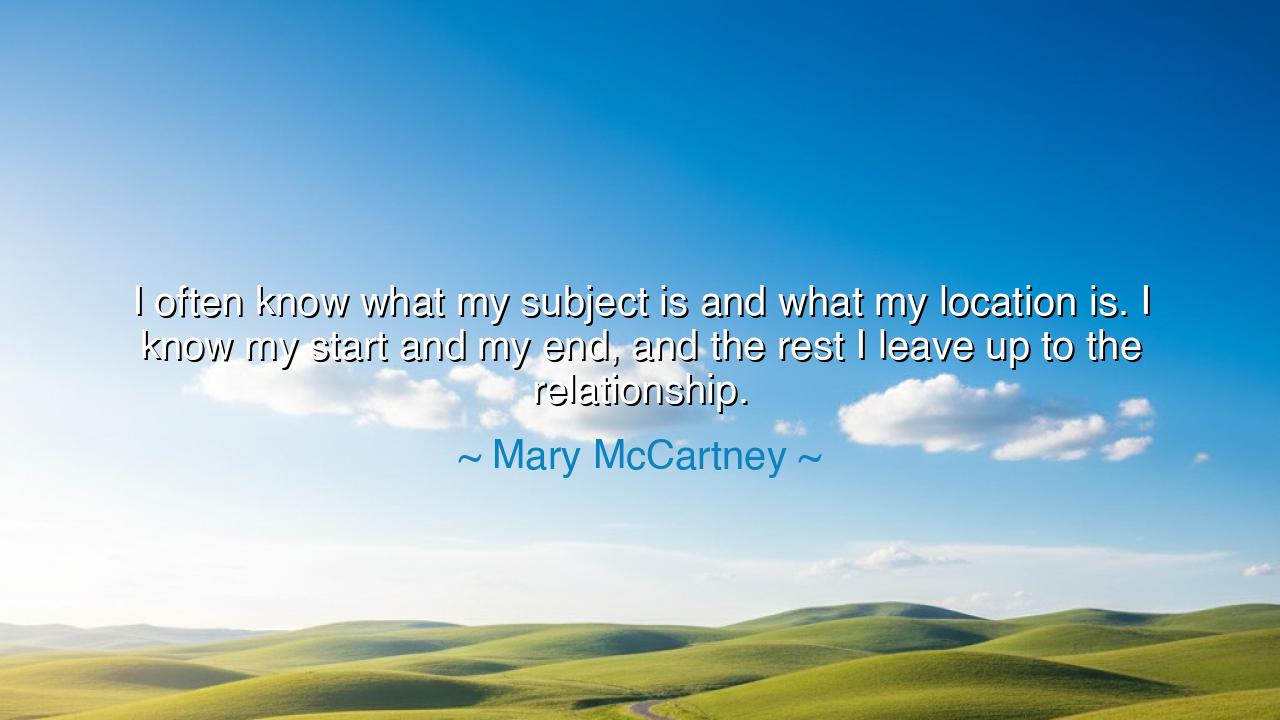
I often know what my subject is and what my location is. I know
I often know what my subject is and what my location is. I know my start and my end, and the rest I leave up to the relationship.






In the reflective words of Mary McCartney, “I often know what my subject is and what my location is. I know my start and my end, and the rest I leave up to the relationship,” there lies a profound teaching about trust, creation, and the flow of life. She speaks as one who understands that while we may set the stage and prepare the beginning and the end of our journey, the space in between is shaped by connection and mystery. The relationship becomes the living force that guides the unfolding of events, breathing soul into what might otherwise be mere structure.
The origin of this truth stretches back to the ancient storytellers and artisans. In the days when myths were first spoken around the fire, the bards often began with a clear vision of their subject and setting, yet the tale itself evolved through the energy shared between the teller and the listener. This sacred relationship between creator and creation, between giver and receiver, was seen as a divine act, a dance guided by forces greater than the individual. McCartney’s words echo this ancient tradition, where art is not only planned but also allowed to grow freely, like a river winding between mountains.
To know one’s start and end is to possess intention and purpose. These are the anchors that prevent the soul from drifting aimlessly. Yet, if one tries to control every step along the path, the work becomes rigid and lifeless. By surrendering the middle journey to the relationship, McCartney teaches the power of trust: trust in the subject, in the process, and in the moment itself. This is where authenticity is born, for only when there is space for spontaneity can true beauty emerge.
Thus, her words are a lesson not only for artists, but for all who walk the road of creation and life. Plan what you can, set your start and end, but leave room for the sacred unknown. In the interplay between intention and openness, between vision and relationship, the soul discovers its deepest truths. This is the way of the ancients and the modern alike, for it is in this space of trust and connection that the most enduring works—and the most meaningful lives—are shaped.






Bbbjhj
Mary McCartney’s quote shows how much trust she places in the dynamics of the relationship, which is really powerful. It makes me think about how often we try to control every detail in our lives and projects. What would it be like to give more freedom to the relationships we form, whether with people, ideas, or our own creative process? How often do we trust the journey instead of just focusing on the destination?
TTam
I find Mary McCartney’s approach fascinating because it focuses on the unpredictable element of creativity—the relationship. It’s as if the magic happens in the space between the boundaries she sets. How does this approach work in a world that often values control and certainty? Do we allow ourselves enough room to let our connections influence our outcomes, or are we too focused on results to let relationships play their natural role?
NNNgan Nguyen
Mary McCartney’s perspective is such a refreshing take on the creative process. It’s about having direction, but not being too rigid, which I think speaks to the value of flexibility in life. How much do we let our relationships—whether personal or professional—guide us in achieving our goals? Can we really let go of control in certain areas, or do we need to be more structured to feel secure?
HNtran hong nhung
This quote from Mary McCartney really made me reflect on the balance between control and freedom in creativity. She knows the starting point, the subject, and the endpoint, but she allows the relationship to shape the journey. In a world that values precision and planning, how can we find the courage to leave space for spontaneity and human connection in our own work or lives? Does this approach lead to more authentic results?
ATAnh Tuyett
I love Mary McCartney’s philosophy here. It’s all about having a clear vision, but also allowing flexibility in how you get there. Isn’t that what life is often about—knowing where you want to go but allowing for unexpected turns along the way? How often do we trust in the process and the relationships we form, both professionally and personally, to guide us through unknown territory?